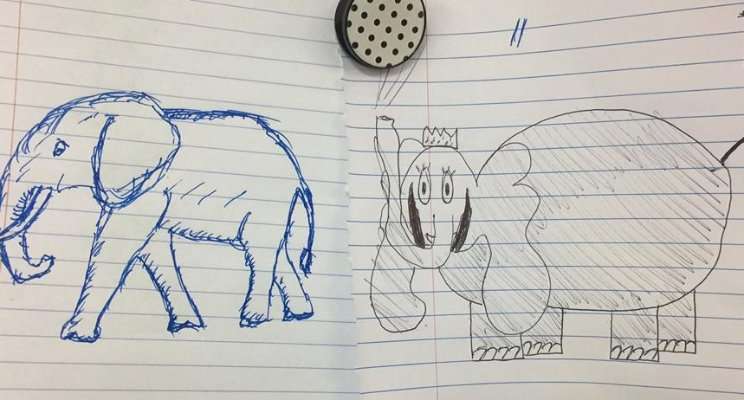Original article, published in the Tampa Bay Times
 The photo shown is of two hand-drawn elephants — one by my boss, and the other by me, (mine is the better one). Why, you may ask? Because we had an elephant drawing contest at our office on company time. This may not be common for most workplaces, but at Davron, it’s part of our culture. Let me explain to you what company culture is, and why it’s so important to take it into account before choosing a new career opportunity.
The photo shown is of two hand-drawn elephants — one by my boss, and the other by me, (mine is the better one). Why, you may ask? Because we had an elephant drawing contest at our office on company time. This may not be common for most workplaces, but at Davron, it’s part of our culture. Let me explain to you what company culture is, and why it’s so important to take it into account before choosing a new career opportunity.
Sidenote: Our next rivalry is a penguin drawing competition. Be on the lookout for photos so you can cast your vote (pick mine).
Company Culture
The majority of people have heard of it, but do not pay as much attention to it as they should. It’s something that needs to be taken into consideration, as it could affect the chances of someone getting his/her “dream job”. If there is a disconnect between a company’s culture and a candidate’s personality, it’s probably not going to end in either party’s favor. If the company decides to “take a chance” and hire the candidate because “they’re perfect for the position”, it most likely won’t end well.
What is company culture?
A company’s culture refers to the environment and atmosphere of which a company operates. This includes company goals, mutual linguistics, employee habits, routine dos and don’ts, etc. Company culture has to do with the verbal and nonverbal actions that are present in the workplace.
For example, a new employee starts working at a firm with a very corporate atmosphere. Said employee is also proficient in sarcasm. It’s a difficult task to separate your entire personality from your professional persona. This new employee may find this workplace to be a bit stuffy. It works vice-versa as well. A new employee could be extremely professional with a large corporate background and a complete play-it-by-the-book attitude. In a company where the atmosphere is more casual and sans micro-managers, their new employee may not know how to function.
So, how can you tell whether you’ll fit into a company’s culture?
Evaluate the lobby
When walking through your future potential employer’s front doors, how do you feel? You should immediately be able to assess the room you’re in, which most likely sets the mood for the rest of the organization. The lobby is the first impression when it comes to a company meeting clients, future employees, potential vendors, etc. This room is essentially a summary of the company set into an office space, so look around. Notice any photos on the walls of employees, company awards, maybe a “No weapons beyond this point” sign? The possibilities are endless.
If you notice something that specifically stands out to you, analyze how that makes you feel and apply that to your choice when deciding if you’d accept an opportunity for this company.
Interviewer’s vibe
While you’re sitting across from the hiring manager, and whoever else may be in the interview, try to become in tune with each person who speaks to you. Focus on the qualities of the main professional who is interviewing you. Pay attention to how you connect with this person because, most likely, they’ve had some kind of say in hiring other employees in the office. If they rub you the wrong way, chances are the company’s employees may not coincide with your personality either.
The Ride Home
When you get into your car after this interview, weight will instantly be taken off your shoulders. Either you blew it and know it, or you exceeded your expectations and know for a fact that this company is where you belong. Regardless, go with your gut. You now know how you feel about accepting an opportunity with this company. It’s either somewhere you’d love to be with a team you’d love to be a part of, or you couldn’t imagine yourself there any longer than the interview lasted.
It’s so important to take into consideration every aspect of an interview. Pay attention to the little things in an interview, how you feel while you’re in the lobby, your thoughts when you get back into your car. Don’t ignore the details, this is your career we’re talking about.

